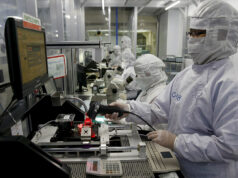Ayalas’ IMI sees recovery path
By Denise A. Valdez, Reporter
AYALA-LED Integrated Micro-Electronics, Inc. (IMI) is starting to see opportunities for recovery from the display solutions and medical technology markets amid the coronavirus disease 2019 (COVID-19) pandemic.
In its annual stockholders’ meeting held online on Wednesday, the electronics manufacturer said it is optimistic of the company’s increased relevance despite the evolving landscape due limitations in mobility.
It also noted its facilities in China are now operating again after closing for more than a month from February to early March.
“Certainly there’s a short-term impact given the shutdown of the business that we see. But we actually see new opportunities [as well],” IMI Chief Financial Officer Jerome S. Tan said about the COVID-19 pandemic.
“For instance, in China… it has started to normalize and it has recovered the lost sales that we have in that period in the areas of the medical field and the 5G (fifth generation technology) deployment. So we’re seeing, at least for the first half, our China (operations) will be back on track,” Mr. Tan said.
IMI has four facilities in China that suspended work in the first quarter as a response to the COVID-19 crisis. When the virus spread to more countries, IMI was forced to partly shut down plants in the Philippines in mid-March and close facilities in Mexico in early April.
But Mr. Tan said the company is already seeing light at the end of the tunnel, as demand for its products has started to recover.
For one, he said there is now a strong demand for visual solutions products, and IMI’s display solutions arm VIA Optronics (Suzhou) Co. Ltd. is only waiting to ride on the wave.
“VIA is not able yet to take advantage of the surge in demand… due to some shortages, but we do see that as China starts to open up, the shortage in the LCD supply would start to be alleviated,” Mr. Tan said.
He also said the company is taking part in a consortium in the United Kingdom, the VentilatorChallengeUK, which produces medical ventilators used to fight the spread of the coronavirus. IMI’s London-based subsidiary STI, Ltd. is in charge of this project.
“Definitely there are short-term challenges, but it also gives us new opportunities that we see opening up in the field of medical area…,” Mr. Tan said.
Moving forward, the company said it is positive that its value will remain, if not grow, as the world adapts to new habits that would require new technologies. Since the company’s focus is on mobility, connectivity and smart energy, Chief Executive Officer Arthur R. Tan said IMI’s strategies would be “very, very important in the very near future.”
“I think mobility and movement will continue to be a future driving force for the whole world. It is much more seen more so today in our current situation… I’m happy to say that in the commercial vehicle requirement, it’s where the majority of (IMI’s) forward technologies that we’re involved with are actually going to be utilized,” Mr. Tan said.
IMI operates plants in the Philippines, China, Bulgaria, Czech Republic, Germany, Japan, Mexico, Serbia, United Kingdom and the United States. The company swung to a net loss of $7.78 million in 2019 due to the declining electronics market environment across the world.
Shares in IMI at the stock exchange climbed 20 centavos or 4.35% to P4.80 each on Wednesday.



